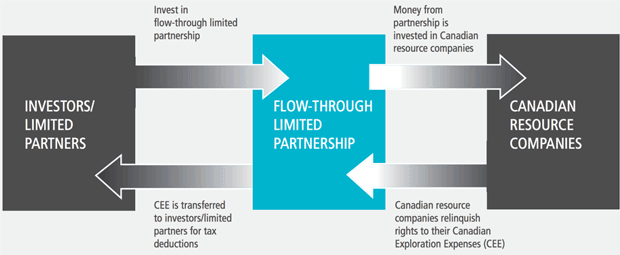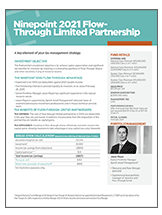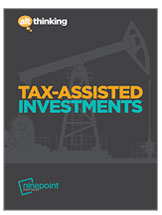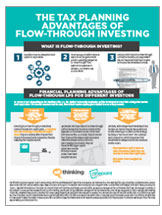Ninepoint 2021 Flow-Through LP
Why Invest in Ninepoint 2021 Flow-Through LP
- Expected to be 100% tax-deductible against 2021 taxable income.
- Full liquidity prior to Feb 28, 2023.
- Effectively converts income into capital gains, allowing investors to take advantage of any capital loss carry-forwards.
Flow-Through Share Tax Savings Calculator
Use the calculator to estimate tax savings that could be realized with a Flow-Through investment.
One of the few remaining advanced tax planning strategies in Canada
Much like RRSPs, Flow-Through share investing allows the investor to deduct 100% of the investment against personal income in the year of investment. On termination of the Flow-Through LP, the investment is rolled into a designated mutual fund corporation. The investor may now sell the fund, where their taxable capital gain is limited to 50% of the proceeds.
An excellent wealth planning tool
In combination with the tax deferral achieved by the corporate class roll-over, an investor may also take advantage of any capital loss carry-forwards they have, which can be used to offset their capital gain.
Additional tax credits may apply
Depending on your province of residency, additional tax credits may be available that are not included in the calculator below.
Please be sure to consult with your Financial Advisor to determine if this type of investment is suitable for your objectives.
This calculation tool is of a general nature only and is not intended to be, nor should it be construed to be, legal or tax advice to any particular investor, and no representations with respect to the tax consequences to any particular investor are made. There are many aspects of federal and income tax laws which may be relevant to any potential investor. Accordingly, each prospective investor should obtain independent advice from a tax advisor who is knowledgeable in the area of income tax law regarding the income tax considerations applicable to investing in flow-through funds based on the investor’s own particular circumstances.
The income tax considerations applicable to an investor will vary depending on a number of factors, including whether units of flow-through funds are characterized as capital property, the province or territory in which he or she resides, carries on business, or has a permanent establishment, the amount that would be his or her taxable income but for the interest in the flow-through fund, and the legal characterization of the investor as an individual, corporation, trust, or partnership.
Ninepoint Partners LP assumes no responsibility for any losses or damages, whether direct or indirect, which arise out of the use of this information. The information should not be regarded by recipients as a substitute for the exercise of their own judgment or for the advice of legal and tax advisors.
The Fund is generally exposed to the following risks. See the prospectus of the Fund for a description of these risks: Speculative Investments; Sector Risks; Lack of Operating History of the Partnership; Changes in Net Asset Values; Valuation and Liquidity of Resource Issuers; Global Economic Downturn; Tax Related Risks; Risk Factors Specific to Québec Class Units; Lack of Liquidity of Units; Flow-Through Share Premiums; Reliance on the Manager and/or Sub-Advisor; Conflicts of Interest; Possibility that Limited Partners may Receive Illiquid Securities on Dissolution; Financial Resources of the General Partner; Transferability of the Units; Resale Restrictions on Portfolio Securities; Short Sales; Derivatives; Lack of Suitable Investments; Cybersecurity Risk; Possible Loss of Limited Liability; Loan Facility.
The figures shown are not a representation regarding the future value of Units. These figures are for illustrative purposes only and are not intended as a forecast of future events. There is no assurance that such results will in fact be realized.
The tax calculator is updated yearly, once the federal government releases new tax rates. The calculator currently utilizes 2023 tax rates.
Flow-Through Share Investing
What are flow-through shares?
The Federal Government allows Canadian resource companies that invest in the oil and gas, mining and renewable energy sectors to fully deduct certain exploration expenses, known as Canadian Exploration Expenses (CEE). To raise capital for exploration, those companies often issue flow-through shares and pass along the rights to claim the CEE to the purchasers of those shares. The shareholders are then able to deduct the CEE against their own income.
Who should invest in flow-through shares?
Flow-through investing is most suitable for investors taxed at the highest marginal tax rates and who can accept the risk of investing in small to mid-size resource companies.
Flow-Through Limited Partnerships
Investors can access the flow-through market by purchasing shares directly or by investing in a flowthrough limited partnership. Flow-through limited partnerships are investment vehicles that add three important benefits to the tax advantages of flow-through investing: 1) professional management, 2) access to a broad range of flow-through issues, 3) diversification.
The risk of investing in smaller resource companies may be reduced when experienced, professional investment managers select a well-diversified portfolio of companies.
How do flow-through limited partnerships work?
Flow-through limited partnerships provide the same tax benefits as investing in flow-through shares directly. The amounts invested are generally fully or almost fully deductible against taxable income in the year the investment is made.
The illustration below shows how flow-through limited partnerships work.

Investors purchase units of a flow-through limited partnership and the net proceeds are used by the limited partnership to purchase the flow-through shares of resource companies. The resource companies relinquish their CEE rights to the limited partnership, which then allocates the CEE to its investors. The investors can then deduct the CEE against their income.
Most flow-through limited partnerships have a life span of one to two years, enough time to allocate most of the tax deductions to investors. The adjusted cost base of the units (ACB) is reduced by the tax deductions and increased by any capital gains from the investments sold within the limited partnership portfolio. Those capital gains are allocated to investors annually.
At termination, the flow-through limited partnership unitholders receive shares of a corporate class mutual fund and the rollover transaction is completed without triggering an immediate tax liability. This allows investors the option to defer their tax liability further, until they redeem the mutual fund.
Are You An Accredited Investor?
An investment in this Fund requires the financial ability and willingness to accept the high risks and lack of liquidity inherent in this type of an investment. Investors in the Fund must be prepared to bear such risks for an extended period of time and should review suitability with their Investment Advisor.
The minimum subscription amount is $150,000.00 in all jurisdictions, unless you meet the definition of "accredited investor" under National Instrument 45-106 Prospectus and Registration Exemptions.
If you meet the definition "accredited investor" (see below), you may invest a minimum of $25,000. Please consult the Offering Memorandum to determine your qualification status. Investment Advisors should consult their company's internal policies.
The Subscriber, or one or more beneficial purchasers for whom the Subscriber is acting, is (i) a resident of, or the purchase and sale of securities to the Subscriber is otherwise subject to the securities legislation of one of the following: British Columbia, Alberta, Saskatchewan, Manitoba, Ontario, Québec, Newfoundland and Labrador, Nova Scotia, New Brunswick, Prince Edward Island, North West Territories, or Nunavut, and the Subscriber is (and will at the time of acceptance of the Subscription be) an accredited investor within the meaning of National Instrument 45-106 Prospectus and Registration Exemptions ("NI 45-106") because the Subscriber is one of the following:
| (a) | a Canadian financial institution, or a Schedule III bank; |
| (b) | the Business Development Bank of Canada incorporated under the Business Development Bank of Canada Act (Canada); |
| (c) | a subsidiary of any person referred to in paragraphs (a) or (b), if the person owns all of the voting securities of the subsidiary, except the voting securities required by law to be owned by directors of that subsidiary; |
| (d) | a person registered under the securities legislation of a jurisdiction of Canada as an adviser or dealer, other than a person registered solely as a limited market dealer under one or both of the Securities Act (Ontario) or the Securities Act (Newfoundland and Labrador); |
| (e) | an individual registered or formerly registered under the securities legislation of a jurisdiction of Canada as a representative of a person referred to in paragraph (d); |
| (f) | the Government of Canada or a jurisdiction of Canada, or any crown corporation, agency or wholly owned entity of the Government of Canada or a jurisdiction of Canada; |
| (g) | a municipality, public board or commission in Canada and a metropolitan community, school board, the Comité de gestion de la taxe scolaire de l'île de Montréal or an intermunicipal management board in Québec; |
| (h) | any national, federal, state, provincial, territorial or municipal government of or in any foreign jurisdiction, or any agency of that government; |
| (i) | a pension fund that is regulated by the Office of the Superintendent of Financial Institutions (Canada), a pension commission or similar regulatory authority of a jurisdiction of Canada; |
| (j) | an individual who, either alone or with a spouse, beneficially owns financial assets having an aggregate realizable value that before taxes, but net of any related liabilities, exceeds $1,000,000; |
| (k) | an individual whose net income before taxes exceeded $200,000 in each of the 2 most recent calendar years or whose net income before taxes combined with that of a spouse exceeded $300,000 in each of the 2 most recent calendar years and who, in either case, reasonably expects to exceed that net income level in the current calendar year; (Note: If individual accredited investors wish to purchase through wholly-owned holding companies or similar entities, such purchasing entities must qualify under section (t) below, which must be initialled.) |
| (l) | an individual who, either alone or with a spouse, has net assets of at least $5,000,000; |
| (m) | a person, other than an individual or investment fund, that has net assets of at least $5,000,000 as shown on its most recently prepared financial statements; |
| (n) | an investment fund that distributes or has distributed its securities only to:
|
| (o) | an investment fund that distributes or has distributed securities under a prospectus in a jurisdiction of Canada for which the regulator or, in Québec, the securities regulatory authority, has issued a receipt; |
| (p) | a trust company or trust corporation registered or authorized to carry on business under the Trust and Loan Companies Act (Canada) or under comparable legislation in a jurisdiction of Canada or a foreign jurisdiction, acting on behalf of a fully managed account managed by the trust company or trust corporation, as the case may be; |
| (q) | a person acting on behalf of a fully managed account managed by that person, if that person:
|
| (r) | a registered charity under the Income Tax Act (Canada) that, in regard to the trade, has obtained advice from an eligibility adviser or an adviser registered under the securities legislation of the jurisdiction of the registered charity to give advice on the securities being traded; |
| (s) | an entity organized in a foreign jurisdiction that is analogous to any of the entities referred to in paragraphs (a) to (d) or paragraph (i) in form and function; |
| (t) | a person in respect of which all of the owners of interests, direct, indirect or beneficial, except the voting securities required by law to be owned by directors, are persons that are accredited investors; |
| (u) | an investment fund that is advised by a person registered as an adviser or a person that is exempt from registration as an adviser, or; |
| (v) | a person that is recognized or designated by the securities regulatory authority or, except in Ontario and Québec, the regulator as an accredited investor. |





